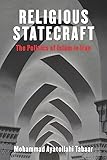Religious Statecraft : The Politics of Islam in Iran / Mohammad Ayatollahi Tabaar.
Material type: TextSeries: Columbia Studies in Middle East PoliticsPublisher: New York, NY : Columbia University Press, [2018]Copyright date: ©2018Description: 1 online resourceContent type:
TextSeries: Columbia Studies in Middle East PoliticsPublisher: New York, NY : Columbia University Press, [2018]Copyright date: ©2018Description: 1 online resourceContent type: - 9780231183666
- 9780231545068
- 322/.10955
- BP173.7 .T32 2018
- BP173.7
- online - DeGruyter
- Issued also in print.
| Item type | Current library | Call number | URL | Status | Notes | Barcode | |
|---|---|---|---|---|---|---|---|
 eBook
eBook
|
Biblioteca "Angelicum" Pont. Univ. S.Tommaso d'Aquino Nuvola online | online - DeGruyter (Browse shelf(Opens below)) | Online access | Not for loan (Accesso limitato) | Accesso per gli utenti autorizzati / Access for authorized users | (dgr)9780231545068 |
Frontmatter -- Contents -- Preface -- Introduction: The Politics of Islam -- 1. The Factional Causes and Religious Consequences of Politics -- 2. A Shi'a Theory of the State -- 3. The "Islamic" Revolution -- 4. Institutionalizing Velayat-e Faqih -- 5. The Hostage Crisis: The Untold Account of the Communist Threat -- 6. Religion and Elite Competition in the Iran-Iraq War -- 7. The Metamorphosis of Islamism After the War -- 8. The Factional Battle Over Khomeini's Velayat-e Faqih -- 9. Media, Religion, and the Green Movement -- 10. Historical Revisionism and Regional Threats -- 11. The Domestic Sources of Nuclear Politics -- Conclusion -- Notes -- Index
restricted access online access with authorization star
http://purl.org/coar/access_right/c_16ec
Since the 1979 revolution, scholars and policy makers alike have tended to see Iranian political actors as religiously driven-dedicated to overturning the international order in line with a theologically prescribed outlook. This provocative book argues that such views have the link between religious ideology and political order in Iran backwards. Religious Statecraft examines the politics of Islam, rather than political Islam, to achieve a new understanding of Iranian politics and its ideological contradictions.Mohammad Ayatollahi Tabaar traces half a century of shifting Islamist doctrines against the backdrop of Iran's factional and international politics, demonstrating that religious narratives in Iran can change rapidly, frequently, and dramatically in accordance with elites' threat perceptions. He argues that the Islamists' gambit to capture the state depended on attaining a monopoly over the use of religious narratives. Tabaar explains how competing political actors strategically develop and deploy Shi'a-inspired ideologies to gain credibility, constrain political rivals, and raise mass support. He also challenges readers to rethink conventional wisdom regarding the revolution, Ayatollah Khomeini, the U.S. embassy hostage crisis, the Iran-Iraq War, the Green Movement, nuclear politics, and U.S.-Iran relations. Based on a micro-level analysis of postrevolutionary Iranian media and recently declassified documents as well as theological journals and political memoirs, Religious Statecraft constructs a new picture of Iranian politics in which power drives Islamist ideology.
Issued also in print.
Mode of access: Internet via World Wide Web.
In English.
Description based on online resource; title from PDF title page (publisher's Web site, viewed 29. Mrz 2022)


